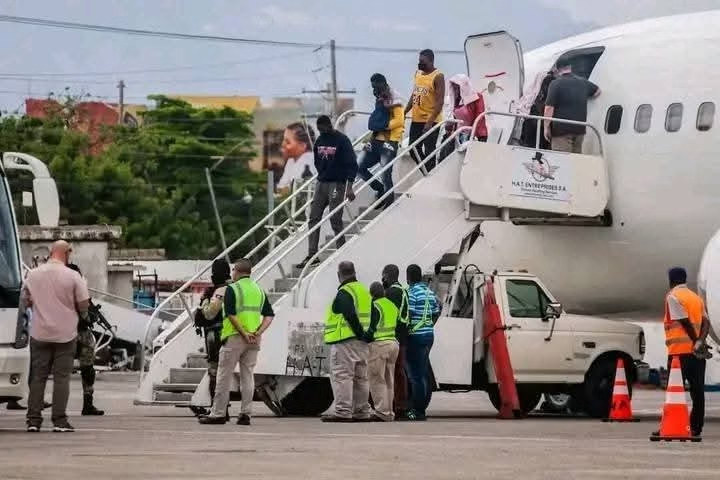The Trump administration’s rhetoric on immigration policy is beginning to yield results for the MAGA camp. According to CBS News, many individuals have reportedly decided to return to Haiti voluntarily.
A CBS News team visiting Haiti after the federal government announced the termination of Temporary Protected Status (TPS) for Haitians as of September 2 reported that two flights from Miami to Haiti were already full at the time of their special report from Cap-Haïtien. Several other outlets have also noted a recent increase in flights to Haiti.
The Trump administration has launched an aggressive campaign urging undocumented immigrants to “self-deport” if they wish to preserve the possibility of returning to the United States in the future. Many appear to have decided it is not worth the risk. They are now heading back to a country gripped by an unprecedented political and security crisis.
CBS, one of the leading U.S. media networks, visited Haiti shortly after the Department of Homeland Security (DHS) announced on Thursday the end of TPS protections for Haitian nationals. CBS reported that the decision sparked widespread alarm not only within the diaspora but also on the ground in Haiti.
In a report aired by CBS Miami, journalist Tania Francois noted that the DHS announcement spread rapidly on Friday, casting a tense and resigned atmosphere across the streets of Cap-Haïtien.
In Cap-Haïtien, residents already fear a worsening humanitarian crisis. The city, already overwhelmed by the arrival of thousands of internally displaced people fleeing gang violence in Port-au-Prince, is bracing—reluctantly—for a new wave of deportees from the U.S.
One testimony collected by the CBS crew came from Virme Wilmond, who voiced a widely shared anxiety:
“We are already dealing with the gang problem and a humanitarian crisis. All these people need food. We have no medical care. How are we supposed to take in all these people? It’s a real problem, I’m telling you,” he told the team reporting from Haiti’s second-largest city.
Several residents criticized the complete lack of preparation by local authorities, the dilapidated state of public services, and the absence of any reception or support plan.
Robin Nash, a Haitian-American from Los Angeles visiting Cap-Haïtien, also shared her dismay with CBS Miami over the state of the city center:
“There’s already a housing crisis here, and if you go downtown, it’s just trash everywhere. It looks like the worst ghetto you could imagine,” she said, adding that she had seen no improvement since her last visit.
On the U.S. side, DHS Secretary Kristi Noem defended the end of TPS by claiming that conditions in Haiti had improved, and that extending protections would be contrary to the national interest of the United States.
But to the Haitians interviewed by Tania Francois, that assessment is entirely disconnected from the situation on the ground. The TPS program will officially end on August 3, 2025, with full termination set for September 2. Without legal recourse, over 500,000 Haitians currently protected by TPS could be forced to return to a country ill-equipped to receive them.
The DHS has cited a State Department report indicating a marked improvement in security conditions in Haiti. However, less than 48 hours earlier, the same State Department had urged all U.S. citizens to leave Haiti as soon as possible due to a deterioration in the security situation.
In a statement released Wednesday, the U.S. Embassy in Haiti called on remaining U.S. nationals to depart as soon as conditions allow.
Given the ongoing instability and high security risks, U.S. authorities are recommending prompt departure via commercial flights or other available private transport.
Domestic air connections have recently resumed between Cap-Haïtien International Airport and two other destinations: Antoine-Simon Airport in Les Cayes and the Guy Malary terminal in Port-au-Prince. Though limited, these flights are crucial options for those seeking to leave the country.
However, the embassy warned against non-commercial flights, particularly helicopter travel from unofficial sites. These routes, while sometimes used, present significant risks that travelers should weigh carefully.
U.S. government personnel are not authorized to use commercial flights to or from Port-au-Prince due to Federal Aviation Administration (FAA) restrictions and ongoing security threats. The embassy further clarified that it does not endorse any private or commercial carriers.
In its statement, the embassy urged American nationals to remain vigilant and adopt strict security measures: avoid crowds, monitor local news, steer clear of high-risk areas, limit nighttime travel, and keep identity and travel documents readily accessible. The embassy also advised citizens to prepare for a possible extended lockdown.
“Do not travel to Haiti. If you are currently in Haiti, leave as soon as you can safely do so,” the statement emphasized. The embassy continues to offer consular assistance and closely monitor developments on the ground.
Two days after the release of this statement, the State Department determined that conditions had improved sufficiently to recommend ending TPS for more than 520,000 Haitians living in the United States.







